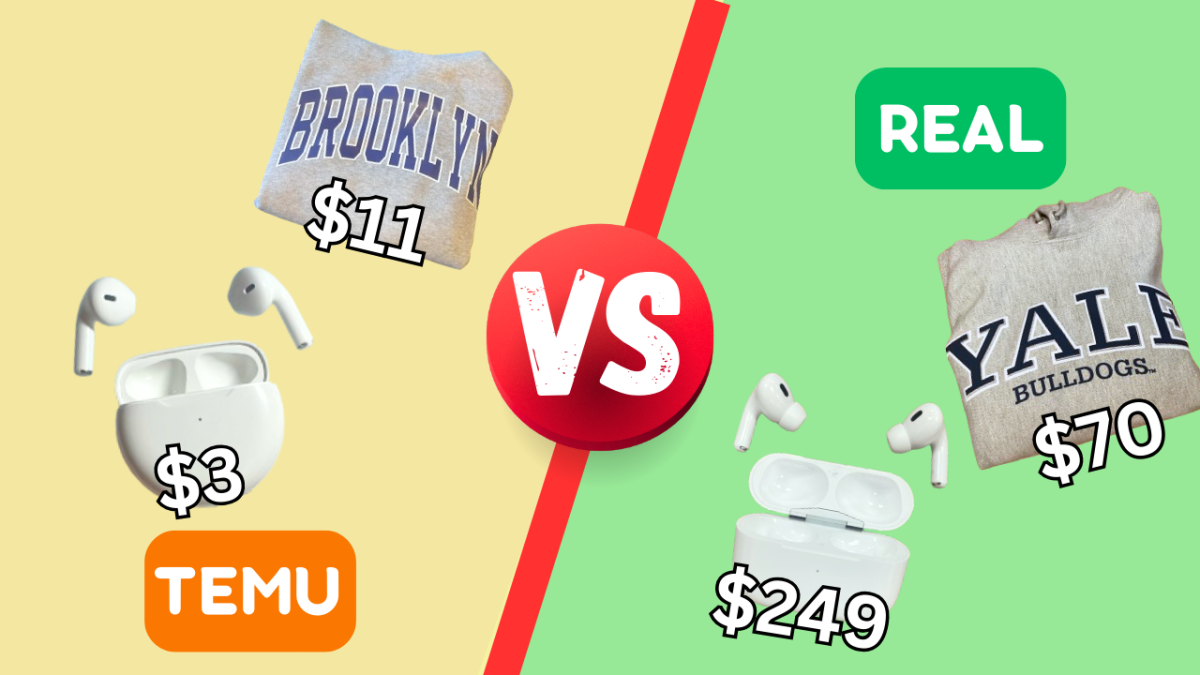With games that reward referrals and purchases with credit and cash, Temu has skyrocketed to the #1 spot on the Apple app store. But the low prices and insane deals – from $6 mini projectors to $2 humidifiers – have also prompted users to question the legitimacy of Temu’s products. As one of those users, I decided to conduct my own investigation.
First I’ll explain how Temu’s products are so cheap, then I’ll dive into the issues with Temu, and finally, I’ll compare two Temu products with their high-end counterparts.
How is Temu so Cheap?
How does Temu, the heavily discounted online marketplace, keep its prices so low? Temu publicly claims that it is because they have direct access to suppliers, but many companies, such as Amazon, also have direct access to suppliers but are not able to keep prices as low as those of Temu’s. There are five more likely reasons why Temu is so cheap. One, according to WIRED, Temu loses, on average, $30 per order to gain traction in the U.S. markets. Second, Temu pressures manufacturers to lower their prices for customers, leaving the manufacturers with little to no profit. Third, Temu has the advantage of being a part of the large Chinese conglomerate Pinduoduo (PDD Holdings) which has promoted a similar business strategy in China for the past couple of years. Temu can thus apply already existing business relations and infrastructure to their U.S. venture. Fourth, Temu relies on the de minimis provision — in short, the US does not inspect or tax imports with a value under $800 per person per day.
Last, and most tragically, Temu keeps prices cheap through low labor costs, prompting allegations of using forced labor. Although Temu only functions as a marketplace — they don’t directly control the manufacturers — they have claimed that they strictly regulate these manufacturers by removing any sellers that violate these guidelines. Working conditions, however, are still ultimately up to manufacturers themselves. In an ideal world, outsourced labor on the manufacturers’ part should follow the guidelines that Temu set, but in practice, many of these promises may not be upheld.
In a 2023 report by the House Select Committee on the Chinese Communist Party, the committee found that “Temu conducts no audits and reports no compliance system to affirmatively examine and ensure compliance with the [Uyghur Forced Labor Prevention Act]. The only measure Temu reported that it takes to ensure that it is not shipping goods to Americans that are produced with forced labor in violation of U.S. law was that its suppliers agree to boilerplate terms and conditions that prohibit the use of forced labor.”
It isn’t just companies like Temu that are outsourcing labor in unethical ways. Many companies such as Nike and Apple have been caught in human rights and child labor scandals with third-party factories. So while Temu and other fast fashion companies do get a lot of criticism for not having ethical labor practices, it’s also important to note that this is sadly a universal issue.
Information security
Consumers have also raised legitimate concerns about the security of their information. On March 21, Google removed the app of Temu’s parent company, PDD, from the Google Play Store due to discovered malware. Just two days later, PDD disbanded the team of developers who worked on the malware, but many developers from the team were transferred to work on the Temu app.
In a detailed report from CNN, six cybersecurity teams from various countries labeled Temu as having the potential for malware.
As interviewed in this report from CNN, Mikko Hyppönen, chief research officer at WithSecure, a Finnish cybersecurity firm, said they have never seen a mainstream app try to gain that much access to information before.
“Our team has reverse-engineered that code and we can confirm that it tries to escalate rights, tries to gain access to things normal apps wouldn’t be able to do on Android phones,” Hyppönen said.
While there is no concrete evidence that Temu is stealing your information, PDD’s history and expert analyses indicate that there is a high likelihood that your information is being compromised.
Quality of items
Putting aside ethical and security issues, many people also question the quality of the items sold on Temu — bombarded by thousands of cheap generic products, each backed up by tens of thousands of 5-star reviews and 70% off discounts, it is hard to determine which products are the “best” or even legitimate. When starting to search for items on Temu, I faced down the site’s most basic quandary: you can buy everything you could ever want, but not exactly what you want.
In the end, I decided to purchase a pair of $3 Pro 6 earbuds and a $13 men’s casual hoodie to compare to my real pair of $249 Apple AirPods Pro (2nd gen) and a $70 Reverse weave Champion hoodie.
The name of the headphones itself was off-putting. These unbranded earbuds mimic the features, design, and name of the Apple AirPods Pros. With so much competition in the knockoff marketplace on Temu, product listings rely on incomprehensible product names stuffed with buzzwords to rise to the top of search algorithms. Right off the bat, it was clear that these headphones paled in comparison to the high-end Apple version. First of all, there was an obvious weight difference. The Temu Pro 6 earbuds weighed 28g within the case, while the Apple AirPods Pro weighed more than double at 61g. Some other surface-level differences: The Pro 6 came with a circular hockey puck case and earbuds that were a mash between Apple’s AirPod 2nd and 3rd gen. They had a short stem with supposed touch controls that were sometimes unresponsive and had no silicone ear tips like on the AirPod Pros.
But overall, the Pro 6 surprised me. They were Bluetooth, and they also had a decent microphone as well. With a price point of $3, the Pro 6 earbuds were surprisingly good for the price. The audio quality is decent but is pretty obvious if you compare it with the AirPods side-by-side.
One issue I encountered with the Pro 6 earbuds was that the stereo sound was flipped. When testing the audio, the right output channel from your device corresponds with the left earbud, and vice versa. Another issue I found is that with really loud and deep bass sounds, the earbuds created a very annoying buzzing noise. Overall, my take on Temu’s electronics is that although the product will have basic functionalities at a sub-par level it is easy to distinguish from premium name-brand products.
Unfortunately, Temu’s clothing didn’t hold up to the same standard as the electronics. The casual hoodie felt light and thin, weighing 310 g with 100% polyester — a cheaper material — while the Champion Reverse Weave hoodie weighed 771g and was made of 100% cotton. Additionally, the lettering on the Temu hoodie appears to be heat transferred, a process that is cheaper compared to the embroidery found on the Champion hoodie. But in terms of construction, the Temu hoodie doesn’t have anything inherently wrong with it. Polyester and heat transfer techniques are both commonly used in many products today and just because a process is cheaper doesn’t mean it’s less effective. Overall, the quality of clothing from Temu is reflected in the cost of the product, so don’t expect quality from something that costs you $13.
Overall, the choice to use Temu ultimately comes down to your own morals and willingness to gamble. If you’re willing to risk potential information compromises for some questionably sourced products in exchange for really low prices, Temu may be what you’re looking for. But it’s also important to keep in mind that if you do care about the quality of materials and ethicality of labor in your products, sometimes certain big brands will not be the solution you’re looking for either.
















































